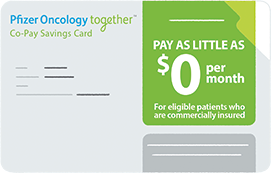Patient Financial Assistance
We’ll help you find financial assistance options for your prescribed Pfizer Oncology treatment, including a co-pay savings program for eligible, commercially insured patients. Limits, terms, and conditions apply. We can also help identify resources if you have Medicare, another government insurance plan, or don’t have health insurance.

Pfizer Oncology Together™, is a personalized patient support program that treats your individual needs as priority. We’ll help you identify financial assistance options so you can get your prescribed BOSULIF. Because when it comes to support, we’re in this together.
Si usted habla español, puede obtener más información sobre los recursos disponibles aquí.

Resources for eligible patients with commercial, private, employer, or state health insurance marketplace coverage:
Co-pay assistance: Eligible, commercially insured patients may pay as little as $0 per month for their Pfizer Oncology treatment. Limits, terms, and conditions apply.a Patients may receive up to $10,000 per product in savings annually.
aPatients are not eligible to use this card if they are enrolled in a state or federally funded insurance program, including but not limited to Medicare, Medicaid, TRICARE, Veterans Affairs health care, a state prescription drug assistance program, or the Government Health Insurance Plan available in Puerto Rico.
Help identifying resources for eligible patients with Medicare/Medicare Part D, Medicaid, and other government insurance plans who express a financial need:
- We can assist patients with searching for financial support from alternate funding resources, which may include financial assistance through Extra Help, a Medicare Part D Low-Income Subsidy (LIS) program
- If support from alternate funding resources or Medicare Extra Help is not available, Pfizer Oncology Together will see if patients are eligible for the Pfizer Patient Assistance Program,b which can provide prescribed Pfizer Oncology medicines for free
bThe Pfizer Patient Assistance Program is a joint program of Pfizer Inc. and the Pfizer Patient Assistance Foundation™. Free medicines from Pfizer are provided through the Pfizer Patient Assistance Foundation™. The Pfizer Patient Assistance Foundation™ is a separate legal entity from Pfizer Inc. with distinct legal restrictions.
Help identifying resources for eligible patients without any form of healthcare coverage:
- We can check patient eligibility for Medicaid and help them understand how to apply
- Patients who do not qualify for Medicaid may receive free medicine through the Pfizer Patient Assistance Program.c Patients must be eligible and reapply as needed
cThe Pfizer Patient Assistance Program is a joint program of Pfizer Inc. and the Pfizer Patient Assistance Foundation™. Free medicines from Pfizer are provided through the Pfizer Patient Assistance Foundation™. The Pfizer Patient Assistance Foundation™ is a separate legal entity from Pfizer Inc. with distinct legal restrictions.




